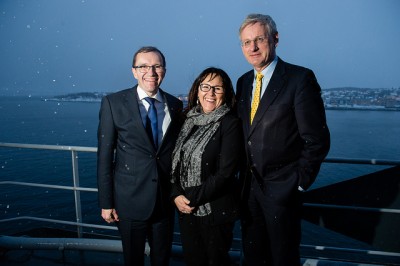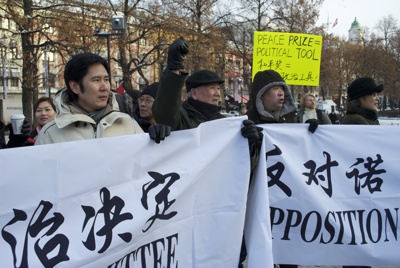UPDATED: Months of diplomatic intrigue ended on Wednesday when Arktisk Råd (the Arctic Council) decided to grant observer status to China and several other countries including Japan and India. Norway, one of eight members of the council, had supported all the observer status applications, which may now improve its long-frozen relations with China.

“We’re glad folks want to be part of our club,” Norwegian Foreign Minister Espen Barth Eide said during one of many conferences on management and strategies for the Arctic areas in Tromsø earlier this year. “Otherwise they’ll start their own club.”
The Arctic Council (external link) operates as a “high-level forum” for the countries with territory extending into the Arctic. Members include all five Nordic countries (Finland, Sweden, Norway, Iceland and Denmark, because of Denmark’s ties to Greenland) plus Russia, Canada and the US.
The council, which has evolved into an important force regarding the future of the increasingly important Arctic areas, held its ministerial meeting this week in Kiruna in northern Sweden, at which its chairmanship also passed from Sweden to Canada. Among the major items on the agenda were the applications for observer status from both the EU and individual countries hoping to gain more influence over Arctic policies agreed by the council.
China has long been anxious to gain some influence through observer status, and that’s been controversial. Leading Chinese dissidents and others concerned about China’s growing economic power have warned against giving Chinese leaders access to meetings and allowing them to contribute to the council’s many “working groups” that deal with such issues as exploitation of natural resources, fishing rights and transport lanes. The latter has attracted especially high interest, as melting ice in the Arctic yields potential for new shipping routes between Asia, Europe and North America.

For Norway, China’s application for observer status presented an opportunity to both assert Norwegian authority (because of Norway’s relatively powerful membership status and vast Arctic territory) but also to mend diplomatic relations with China. They froze in 2010 because of China’s anger over the awarding of the Nobel Peace Prize to one of its leading, and jailed, dissidents, Liu Xiaobo. Chinese leaders have held the Norwegian government at least partly responsible for the prize, which both embarrassed and infuriated them, and top-level government contact between the two countries was broken.
Since all Arctic Council members must unanimously agree on the granting of observer status, Norway played a crucial role in the fate of China’s application. Norway could have blocked China’s bid but instead ended up supporting it while Russia, for example, was critical. Newspaper Aftenposten has reported how leaked US Embassy documents showed that Russia feared Chinese influence at the Arctic Council would shift the balance of power and dilute the council’s own influence in the region.
Russia also ended up supporting China’s entry, though, and now Japan, India, South Korea, Italy and Singapore will get observer status as well. An application from the EU was also controversial, because many EU members already have observer status and the EU’s involvement can become as weighty as China’s. There are concerns the council will simply get too big to function effectively, along with conflicts between Canada and the EU over the EU’s ban on sales of seal products.
After what the Norwegian foreign minister Eide called “intense” negotiations at a working dinner Tuesday night in Kiruna, he told news bureau NTB that council members ended up agreeing to admit the EU as an observer but to delay formal granting of its status until the issues between the EU and Canada are clarified. Eide said EU officials will be allowed to attend and observe meetings but won’t have the same rights of the other observers approved on Wednesday.
Norway’s justification
Eide. meanwhile, claimed he didn’t support China’s application merely to placate China after the past few years of diplomatic tension. “It’s good for us that China agrees to the (council’s) procedures and we chose not to let our demanding relations with China stand in the way (of their observer status),” Eide told Norwegian Broadcasting (NRK). Asked whether he thinks, though, that Norway’s support can ease tensions between Norway and China, Eide said: “It’s at any rate not negative that Norway supported China in this issue.”
It remains unclear, though, what kind of influence any of the new observers will actually have, not least under Canada’s chairmanship. Canada is the only country that did not send its foreign minister to this week’s meeting and its foreign ministry won’t be mainly responsible for council matters. Instead, Canada instead sent its health minister Leona Aglukkaq to take over as chairman from Swedish Foreign Minister Carl Bildt, because she is originally from Canada’s northern areas and has Inuit background. Aftenposten reported that the Canadian government thought it was most important that critical Arctic issues be handled by someone personally familiar with the Arctic and its native people.
That gives an indication of Canada’s priorities, which call for traditional knowledge of the Arctic to play a major role along with scientific research and politics. Members and observers seeing the Arctic Council as a promising arena for difficult territorial and security issues, for example, may be disappointed. Social and development issues may get more attention than international politics.
The sheer international interest in the Arctic Council and its meeting in Kiruna, which also attracted US Secretary of State John Kerry, was generally viewed as positive. Pia Svensgaard, leader of Norway’s northern county of Troms, thinks it’s exciting.
“That so many countries even want observer status in the Arctic Council shows that what’s happening in the Arctic interests and touches many,” Svensgaard told NRK.
Views and News from Norway/Nina Berglund
Please support our news service. Readers in Norway can use our donor account. Our international readers can click on our “Donate” button:

